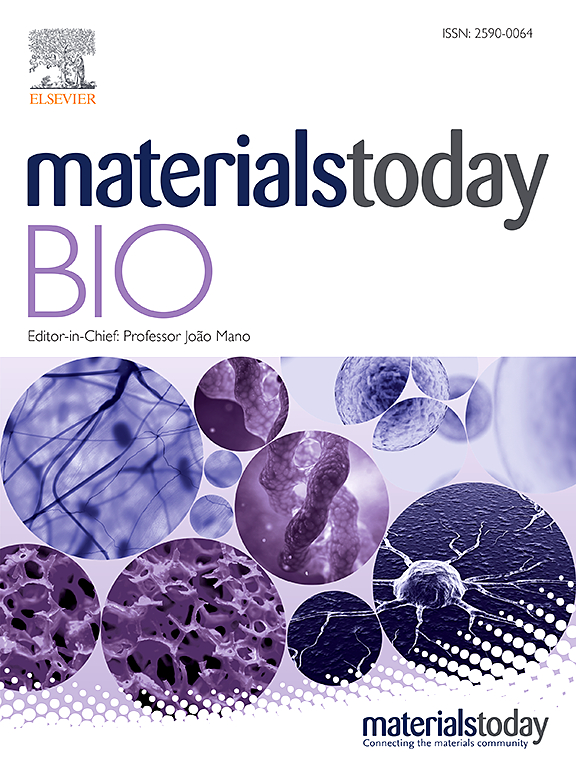异异黄酮胶束微针用于pH监测和糖尿病伤口愈合
IF 10.2
1区 医学
Q1 ENGINEERING, BIOMEDICAL
引用次数: 0
摘要
慢性炎症、氧化应激和血管生成不足会阻碍糖尿病患者的伤口愈合,因此需要长期的治疗策略。在这项研究中,我们开发了基于枸杞多糖硬脂酸胶束的pH响应水凝胶微针(LSI-GCA),可以实现实时pH监测和智能药物释放,有效地管理伤口。采用疏水改性、负载异异黄酮(ISO)、壳聚糖/花青素复合的方法制备了LSI-GCA。LSI-GCA通过激活NRF2通路和抑制促炎因子,表现出良好的生物相容性和抗菌抗氧化性能。动物实验证实,LSI-GCA可显著加速糖尿病模型创面愈合,促进血管生成、胶原沉积和M2巨噬细胞极化。基因组和网络药理学分析揭示了一个多靶点协同机制,涉及调节EGFR/VEGF信号,促进增殖,抑制炎症通路(NF-κB),并通过上调BRCA1/2修复DNA损伤。本研究为糖尿病创面提供了一种综合的“监测-治疗”策略,为临床转化和个性化治疗提供了巨大的潜力。本文章由计算机程序翻译,如有差异,请以英文原文为准。

Isoliquiritigenin micellar microneedle for pH monitoring and diabetic wound healing
Chronic inflammation, oxidative stress, and insufficient angiogenesis hinder wound healing in patients with diabetes, necessitating long-term management strategies. In this study, we developed pH-responsive hydrogel microneedles (LSI-GCA) based on Lycium barbarum polysaccharide stearate micelles that could achieve real-time pH monitoring and intelligent drug release for effective wound management. LSI-GCA was prepared through hydrophobic modification and isoliquiritigenin (ISO) loading, followed by its combination with a chitosan/anthocyanin backing layer. LSI-GCA exhibited excellent biocompatibility and antibacterial and antioxidant properties by activating the NRF2 pathway and inhibiting pro-inflammatory factors. Animal experiments confirmed that LSI-GCA significantly accelerated wound healing in a diabetic model and promoted angiogenesis, collagen deposition, and M2 macrophage polarization. Genomic and network pharmacological analyses revealed a multi-target synergistic mechanism involving the modulation of EGFR/VEGF signaling to promote proliferation, inhibition of inflammatory pathway (NF-κB), and repair of DNA damage through upregulation of BRCA1/2. This study provides an integrated "monitoring-treatment" strategy for diabetic wounds, offering great potential for clinical transformation and personalized treatment.
求助全文
通过发布文献求助,成功后即可免费获取论文全文。
去求助
来源期刊

Materials Today Bio
Multiple-
CiteScore
8.30
自引率
4.90%
发文量
303
审稿时长
30 days
期刊介绍:
Materials Today Bio is a multidisciplinary journal that specializes in the intersection between biology and materials science, chemistry, physics, engineering, and medicine. It covers various aspects such as the design and assembly of new structures, their interaction with biological systems, functionalization, bioimaging, therapies, and diagnostics in healthcare. The journal aims to showcase the most significant advancements and discoveries in this field. As part of the Materials Today family, Materials Today Bio provides rigorous peer review, quick decision-making, and high visibility for authors. It is indexed in Scopus, PubMed Central, Emerging Sources, Citation Index (ESCI), and Directory of Open Access Journals (DOAJ).
 求助内容:
求助内容: 应助结果提醒方式:
应助结果提醒方式:


